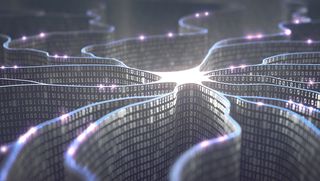The most likely targets of the machine learning revolution
Forget smart assistants - real artificial intelligence is still being schooled

Artificial intelligence, whether you believe it will one day take over the world or not, has seen a surge in media attention over the past year, largely thanks to the rise of the smart assistant. It seems that every major tech player wants to create its own AI, and for many customers, this may be the only exposure they've had to the technology so far.
Yet this form of artificial intelligence is as limited in scope as it is in sophistication. Modern AI has so far only attempted to create a computer program that appears to perform a human task, in the style of a human. However, the core concept of machine learning is to create a computer algorithm that is capable of self-learning without the input of its creator, to identify a problem and change its own processes to solve it.
The reality is that true artificial intelligence takes years to train. After all, we're attempting to create an intelligence that can not only do a job well but a job that no human is capable of. So with machine learning-based AI being developed as we speak, where are we likely to see the real game-changing breakthroughs?
Security
If there's any area that humans could do with some help in, then it's surely security. Over the course of a single year, the world has seen some of the worst data breaches in history, widespread political hacking, and crippling malware campaigns, and it seems we're just getting started. It's clear humans can't be trusted to oversee company security, and so perhaps there's a place for a self-learning AI that is able to automatically defend itself.
Enter Darktrace, a cyber security innovator that considers defence not so much as a series of computer processes, but as an automated immune system. The award-winning firm has developed a software that learns from analysing data without human intervention and is able to adapt to business needs. Yet what's truly impressive is its use of what it calls 'antigens', a feature that allows the system to create specific safeguards for network features in response to a threat, effectively antibodies against a digital virus.
National defence
Get the ITPro. daily newsletter
Receive our latest news, industry updates, featured resources and more. Sign up today to receive our FREE report on AI cyber crime & security - newly updated for 2024.
Nowhere will machine learning be more important than in the industry of defence. In many cases, the analysis of threats and acting appropriately can be a matter of life and death, and armed forces are already beginning to see the value of sophisticated systems that are able to learn from events and potentially avert disastrous accidents.
The Royal Navy has started trialling an AI developed by Roke Manor Research that is designed to help vessels avoid impending threats during combat scenarios. The group says it's built on our own conditioned fear response, learning from past experiences to adapt to new scenarios. The appropriately named Startle system is designed to do a great deal of the threat calculation beforehand, analysing data to give predictions and recommendations for action, rather than simply notifying the crew of a potential attack.
"This is an exciting project for us," said Mike Hook, lead software architect on Startle. "Traditional methods of processing data can be inefficient so we have looked at the human brain's tried and tested means of detecting and assessing threats to help us design a better way to do it."
Following successful in-house trials last year, the company recently told IT Pro that it was getting ready for its first sea trials within the next few months, and that Startle is due to be rolled out to Royal Navy warships as part of its next update programme.
E-commerce
As much as people are afraid of an AI takeover, it may be of some comfort that there's a chance it will help you save some money in the process. Trainline, one of the UK's largest train ticket providers, has developed a tool that is able to analyse past journeys and accurately predict when the next price surge will be.
Trainline's chief product officer Jon Moore, told IT Pro that in-house data scientists have used "historical pricing trends from billions of customer journey searches to predict when the price of an Advance ticket will expire".
"We're introducing more advanced machine learning every day so naturally our predictions will get increasingly accurate. Our mission is to make train travel as simple as possible and price prediction is the first in a long line of predictive features we have planned to help customers save time and money."
The program has already helped customers reduce their advanced fares by up to 49%, and there are plans to add a feature that recommends travel based on busy periods, such as a local football match, and a journey prediction tool that learns a customer's habits.
Natural language processing
Perhaps one of the creepier sides to AI is the idea of it understanding the human language - the potential that we may soon be able to not just chat with a robot but hold full conversations.
Microsoft's Cortana AI is perhaps an early vision of what's to come, having already achieved 'human parity'. This means that Cortana has listened to so much of our blathering that it's now learned to recognise speech as well as any human. This has been 25 years in the making, according to Microsoft, and with an error rate of 5.1%, represents the industry's most accurate AI for speech pattern recognition.
It's an impressive milestone, and essential for creating an AI that is able to make sense of human communications, perhaps one of the most difficult things for a computer to get to grips with. The aim is to transform the simple chatbots of today, that regurgitate statements based on keywords and create something capable of intelligent conversation.
Microsoft has already started work on teaching Cortana to not understand accented speech and dialects, but the intent behind the words. If they can crack that, it will signal a major technological breakthrough.
Dale Walker is the Managing Editor of ITPro, and its sibling sites CloudPro and ChannelPro. Dale has a keen interest in IT regulations, data protection, and cyber security. He spent a number of years reporting for ITPro from numerous domestic and international events, including IBM, Red Hat, Google, and has been a regular reporter for Microsoft's various yearly showcases, including Ignite.





